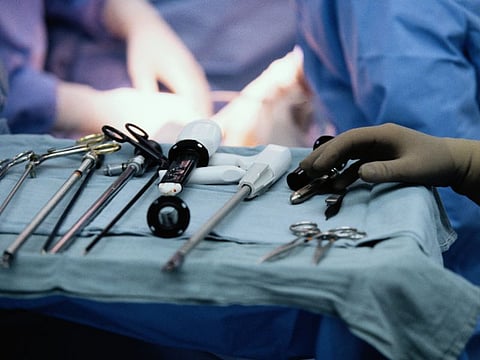SUNDAY, March 17, 2019 (HealthDay News) -- Tucking a pacemaker inside an antibiotic-soaked mesh envelope before implanting it inside your body can drastically reduce your risk of a dangerous infection, a new study shows.
About 1.7 million patients receive cardiac implants like pacemakers or defibrillators every year worldwide, and doctors use preoperative antibiotics to lower the chances of infection.
Nonetheless, about 1.2 percent of these patients will develop a potentially grave infection that's costly to treat, said lead researcher Dr. Khaldoun Tarakji. He's associate section head of cardiac electrophysiology at the Cleveland Clinic.
But a new clinical trial found that if the cardiac devices are implanted inside a mesh envelope that time-releases antibiotics, the risk of infection for that unlucky minority of patients is cut by 40 percent, Tarakji said.
"It's basically a mesh that's embedded with two antibiotics, minocycline and rifampin," Tarakji said. "They release in the pocket within the first seven days after the implantation. The envelope itself dissolves in nine weeks, so there won't be anything left from the mesh itself."
The TYRX Absorbable Antibacterial Envelope has already been approved by the U.S. Food and Drug Administration, but this appears to be the first randomized, controlled clinical trial conducted on its use in heart implants, said Dr. Davendra Mehta, a cardiac electrophysiologist at Mount Sinai St. Luke's and a professor of cardiology at the Icahn School of Medicine at Mount Sinai, in New York City.
"That's really good information, and clearly shows that using the antibacterial envelope decreased infections," Mehta said.
The trial results were to be presented Sunday at the American College of Cardiology's annual meeting in New Orleans. The report will be simultaneously published in the New England Journal of Medicine. The study was funded by Medtronic, the manufacturer of the envelope.
The trial involved nearly 7,000 patients at 181 hospitals in 25 countries, all of whom were scheduled to undergo procedures involving their cardiac devices.
The patients all received standard antibiotics prior to their operation, and then half were chosen at random to also have their device inserted into an antibiotic envelope.
About 1.2 percent of patients in the "control" group developed a major infection, compared with 0.7 percent of patients in the "envelope" group, the researchers found.
Of the major infections, 17 involved endocarditis, a potentially life-threatening infection of the heart's inner lining. Another 50 infections involved the chest "pocket" into which the devices are implanted, and were less serious.
The TYRX envelopes cost between $1,000 to $2,000, Medtronic said.
Patients who have a high risk of infection will likely benefit most from these envelopes, Mehta said. These include patients with diabetes or heart failure, those whose immune systems are compromised by disease or treatment, people with HIV, or folks with a prior history of device infection.
"The envelope totally dissolves. It doesn't leave any scarring or anything like that," Mehta said. "My only concern is the added cost, for the number of procedures you would have to do to prevent one infection."
Cost-benefit data were gathered during the trial and an analysis is upcoming, Tarakji said.
But both Tarakji and Mehta noted that removing a device because of an infection tends to be a very costly proposition.
"When you have an infection that's confirmed, the treatment is not simply antibiotics," Tarakji said. "You have to take the device and the leads out. All the hardware needs to be removed."
The person then needs to receive a new device after a round of antibiotics, Mehta said.
"Infections are fairly expensive," Mehta said. "There's no doubt it would be a huge thing if we can eliminate all infections during device implantation."
The costly process can even be dangerous to the patient if the electrical leads from the device have become attached to the wall of blood vessels through scar tissue, Tarakji said. Special tools, including lasers, must be employed to remove the leads without harm.
"We are very good at these procedures, but the complications that can occur during these extractions of the leads could be fatal," Tarakji said. "Even when you do everything the right way, the mortality rate over the short-term remains high, anywhere from 8 to 15 percent mortality rate after one year."
More information
The American Heart Association has more about cardiac implants.



